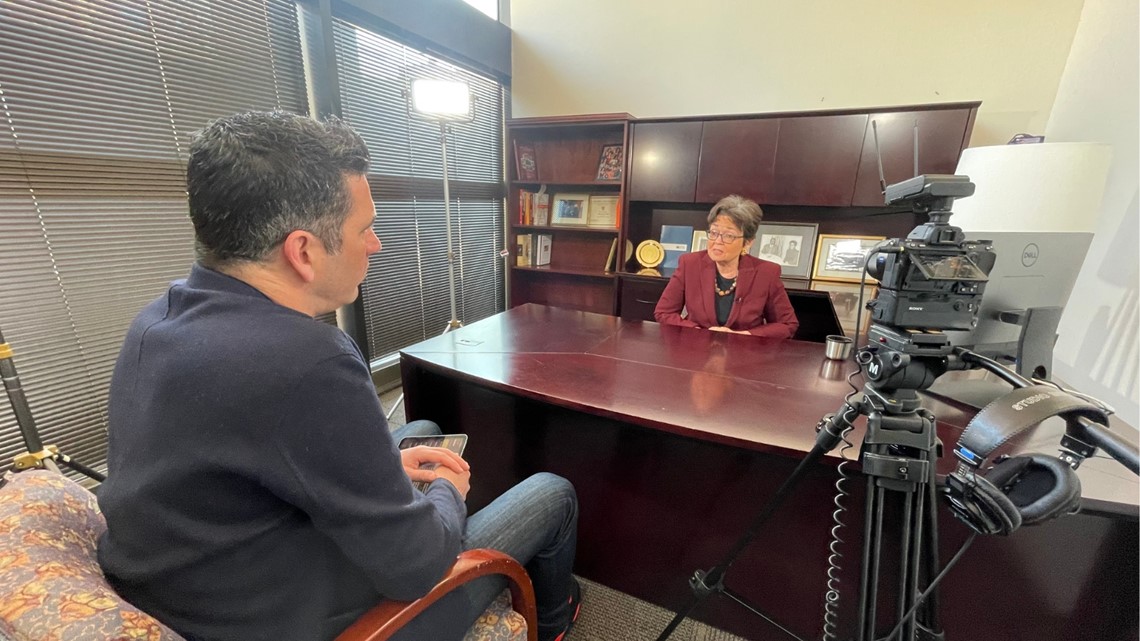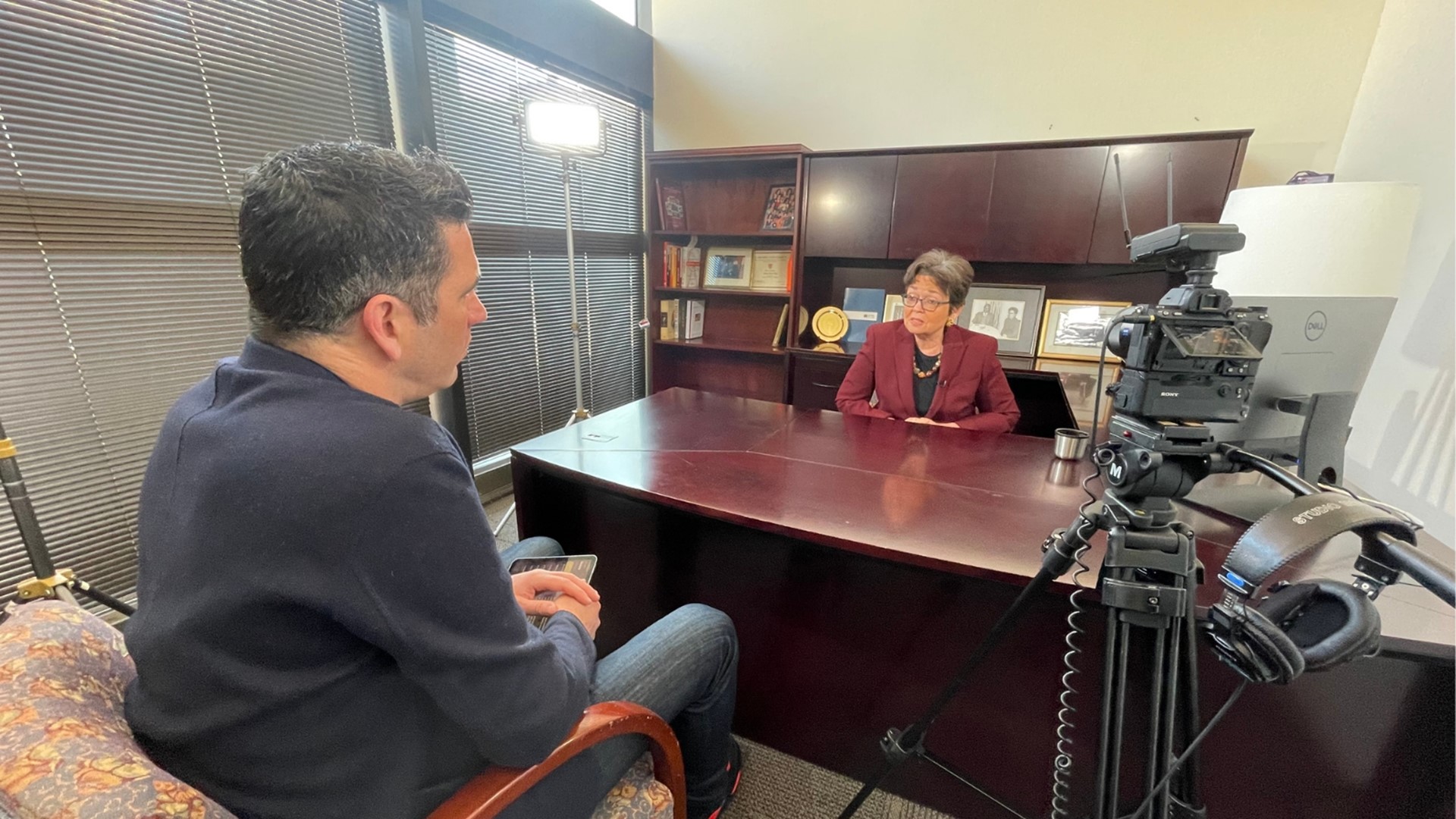WASHINGTON — Sharon Pratt was the first African-American woman to be elected mayor of Washington, D.C. She is also universally blamed for one of the most unpopular decisions in local sports history: the Washington football team's move from the District to Prince George's County.
Pratt says at the time even friends and family pushed her to get a stadium deal done.
“I faithfully watched them. I loved them,” Pratt said.
“My father had two tickets he was a season-ticket holder. He wanted it to stay.”
Sharon Pratt may have broken race and gender barriers when she was elected D.C.’s mayor but she says that did not help her with Washington franchise's owner Jack Kent Cooke, as he brokered a deal for the team’s new football stadium in the early 1990s.
“A race factor and a gender factor. I'd say gender was even more of a factor,” Pratt said in an interview this month from her office in Northwest D.C.
“I didn't get it. I didn't understand the importance of football. I didn't understand the machinations of football,” Pratt said, adding her critics also accused her of not understanding the supposed economic boom a new stadium would bring.
In fact, Pratt said that couldn’t have been further from the truth. She launched the negotiations to lure the then-Washington Bullets from the team's home in Landover, Maryland, to D.C.’s Chinatown district because of the financial upside she saw in a new downtown basketball arena with more than 40 home dates, plus concerts and other events.
But when it came to a new football stadium with only eight to 10 home games plus a few major concerts every year, Pratt says D.C. simply wasn’t in an economic position to get the deal done.
Why?
The team’s proposed new stadium site in D.C. was right next to old RFK and sat on federally controlled land. Cooke wanted Pratt to pull strings in Congress to get them to approve the new construction. But Pratt says the District was already hemorrhaging money. And she said she needed Congress' help to fix the city’s finances instead of signing off on a new football stadium.
“And you know, judge me how you might maybe I should have,” agreed to Cooke’s stadium terms. “It would have been smart for me politically. But I didn't think I could afford to squander or use those political relationships to advance this when we desperately needed those political relationships to advance really troubling issues for the city.”


Pratt was hounded daily by D.C. residents, reporters, and members of her own city council, demanding a stadium deal get done.
“We cannot have a dynamic where we are negotiating against ourselves,” Pratt told reporters during a 1992 exchange at D.C. City Hall.
When talks finally broke off, with Cooke leaving D.C. for Prince George's County and the now maligned FedEx Field, it was Pratt publicly left holding the bag.
“I think he made me the villain,” Pratt said of Cooke. “Is he going to say I don't have the political relationships to get Congress on board? I'm going to blame it on that little colored girl. That's what he did. He basically did that. He basically said, 'She’s sort of new to this. She doesn't understand football, she doesn't understand the importance of it.'
“It was really very easy to do in 1990 something.”
Pratt is now the Founding Director of UDC’s Institute for Politics, Policy and History. Its mission is to rediscover the history of the District through an examination of the past.
Pratt says DC’s present is much different and more profitable than the city she once ran, which led to a surprising revelation about where the former mayor thinks the Commanders' new stadium should be.
Right back where the team tried to build when she was in office -- RFK.
“I think it ought to be in Washington, D.C., I really do,” Pratt said. “We are the ones with the cache. You know, we are the ones that make it exciting. It's a lot more meaningful to have it in Washington, D.C.”
“But, again, that is for Mayor Bowser and her team, you know, to decide. I mean, I don't know what the economics look like; everything is pricier now.
But Pratt warned any stadium deal has to come at the right price for taxpayers.
“It always has to be at the right price. I mean, people forget, a lot of people do a lot of stuff that looks so slick, and so wonderful. And it makes them politically so attractive, all at the taxpayers’ expense.”
Mayor Muriel Bowser says she wants to bring the Commanders' new Stadium to the District, but warned the city is not going to write owner Daniel Snyder a blank check.
Meanwhile, the Virginia legislature passed a bill that would authorize $1 billion in bonds to help Snyder finance a new stadium in Northern Virginia.
Maryland Governor Larry Hogan has said he plans to “fight” to keep the Commanders, but so far has offered few specifics.

